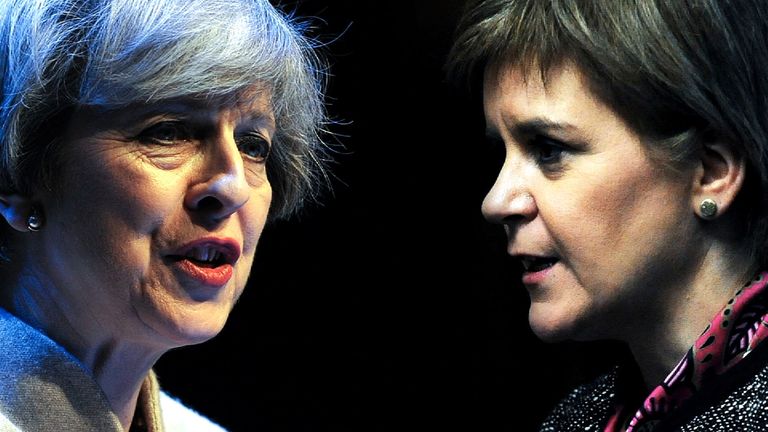Brown's 'third option' for Scotland faces too many obstacles
The former PM's plan for extra devolution after Brexit is unlikely to happen for numerous reasons, says Sky's Robert Nisbet.
Saturday 18 March 2017 20:04, UK
There's an obvious irony that Gordon Brown sees a potential to save one Union with its departure from another.
The former Prime Minister believes that some of the powers which will return to the UK from Brussels when we leave the European Union could be devolved to the nations.
His calculation: if Holyrood gets its hands on the ability to set certain taxes, control fisheries policy and agriculture, then that would blunt the desire for full independence.
Mr Brown summed up his thinking: "When this is explained as a that is neither the extremism of all out independence, nor the status quo which is unsatisfactory now, I think people will come round to that decision."
However the obstacles before this plan are numerous:
* The UK government is not minded to approve more devolved powers. Theresa May has already rejected a call from Nicola Sturgeon for hundreds of millions of pounds of EU funding to be siphoned to Scotland. The government does not want to make any promises when it is about to trigger complex and lengthy Brexit negotiations. The UK's negotiating team won't commit to devolving any sector or competence to the nations when final details could take years to nail down.
* Jeremy Corbyn is not convinced. It's reported that the opposition's leader is lukewarm on the idea, despite the obvious enthusiasm of the shadow chancellor and Scottish Labour - which voted overwhelmingly in favour. Gordon Brown knows his plan's best shot would be the enthusiastic support of a Labour government. The polls suggest that may be some way off.
* History is not on its side. Before the 2014 referendum the SNP's then leader Alex Salmond tried to suggest a third option which became known as "Devomax", involving more powers being devolved from Westminster. This was dropped to the simple 'yes' or 'no' choice because the party couldn't muster enough support.
* Creating a new federal state would be complex in the extreme. Parliament is already facing the monumental task of enacting Brexit which will involve constitutional unpicking on a grand scale. It is unlikely there would be the appetite for drawing up plans for another upheaval, either concurrent or subsequent to our EU divorce.
However the kernel of his idea might well be used to widen the debate by opponents of independence if the binary choice seems to be moving in the SNP's direction.
Nicola Sturgeon clearly relished the support of her party on Saturday for her push for a second referendum, but the polls are not showing a large uptick in support for separation.
Her calculation rests on support growing if the Brexit talks founder, and that Theresa May's intransigence over the timing of a vote might move the polls.
It is a high stakes gamble for the SNP, but one where Nicola Sturgeon felt she had to play her hand early, before the triggering of Article 50.
That timing may prove to be an act of political inspiration - or judged too early after 2014's "once in a generation" opportunity.






